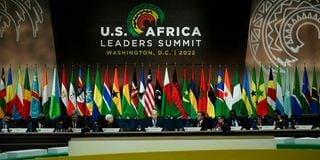US pursues stronger African ties with eye on China, Russia

US President Joe Biden participates in the US-Africa Leaders Summit closing session on "Promoting Food Security and Food Systems Resilience." at the Walter E. Washington Convention Center in Washington, DC, on December 15, 2022.
The US is upping its engagement with Africa in a bid to reclaim part of influence Washington believes has been chipped away by Beijing and Moscow.
This week, more American diplomats were interacting with African counterparts either virtually or physically, with focus on trade and economic development featuring.
The US and Kenyan officials, for instance, began in-person rounds of conceptual discussions under their Strategic Trade and Investment Partnership (STIP) in Washington.
The meetings from February 6 to 10 marked the first physical interaction since the STIP was announced last year in July to replace the Trump-era talks on a bilateral trade deal.
Washington also sent a diplomat to join five other Western envoys to Sudan, where they encouraged formation of a civilian transitional government, on the same week Russian Foreign Minister Sergei Lavrov was touring.
Following the the US-Africa Summit in December, President Joe Biden has promised to send more officials to Africa.
And before end of 2023, President Biden is also expected to make the first foreign trip to the continent.
The US had pledged $55 billion in investment in African, targeting infrastructure, agriculture, energy, health systems, information technology and security over the next three years in a renewed effort to counter China’s growing influence on the continent.
More money for infrastructure is to come from the $600 billion initiative proposed by Washington at the G7 meeting earlier last year, known as the Partnership for Global Infrastructure and Investment.
Each of the G7 members is supposed to top up a proposal by the US to raise $200 billion by 2027.
The proposals though, are meant to outcompete China and Russia, who seem to have cemented their influence in Africa through infrastructure investments and security pacts.
Samuel Ramani from the South African Institute of International Relations argues that Russia and China have succeeded in ties with Africa largely by finding a common enemy in Western bullying.
“Russia and China coordinate on challenging Western norms, eroding US-initiated unilateral sanctions and supporting non-interference in the internal affairs of states,” he observed in a recent paper on Russia and China in Africa: Prospective Partners or Asymmetric Rivals? For example, while Russia is sanctioned by Western countries over its invasion of Ukraine, African countries have refused to give blanket condemnation. China too, declined to condemn Russia.
Last month US Treasury Secretary Janet Yellen and US ambassador to the United Nations Linda Thomas-Greenfield on their Africa visits spoke of countering Beijing and Moscow.
The trips came shortly after Foreign Minister Qin Gang, as Russian counterpart Sergei Lavrov travelled to a number of African capitals. Lavrov returned to Africa last week, touring Sudan, Mali and Mauritania.
“I worked in the Africa Bureau back in the early 2000s when we worked – the administration at that time worked to help African countries address their debt issues, and China has come in and re-indebted these countries,” said Ms Thomas-Greenfield during the trip that saw her visit Kenya, Mozambique and Ghana over five days from January 25.
“And so Secretary Yellen’s visit, I think, highlighted some of those issues and highlighted our efforts to assist those countries to address the debt problems, to assist them in moving forward.”
These engagements, some argue, can be insufficient for the US, however, especially if they are not consistent.
“China has made huge financial investments across the world— from ports in Sri Lanka, to railroads in Kenya, to bridges, management and logistics in the Panama Canal, each adding to (President) Xi’s leverage over nations who find themselves heavily indebted to China and unable to push back on Beijing’s demands,” argued Senator Bob Menendez, the Chairman of the US Senate Relations Committee at the Full Committee Hearing on ‘Evaluating US-China Policy in the Era of Strategic Competition,’ on Thursday this week.
“As we think about our own posture in the world, we must recognise that China has also invested heavily in proactive diplomacy. China now has more diplomatic posts than any other country. Chinese diplomats are on the ground, making the case for China’s values, pushing for Chinese investment—and the United States isn’t keeping up.”
One problem, the Senator noted, is continual understaffing of critical diplomatic missions in Africa. For example, until recently, the US Embassy in Addis Ababa had no substantive ambassador. And it took Biden nearly a year to fill positions in Nairobi and Pretoria. Some missions like in Niger, Mali, Mauritania and Chad are understaffed even though they are also stations where China and Russia enjoy strong ties.
China is also the biggest bilateral trading partner for Africa growing by 11 percent in 2022 to $282 billion. China is also the biggest infrastructure builder in Africa.
This week, Beijing said African countries are free to choose partners but accused the US of simply seeking to mudslinging China.
“Competition is no excuse for vilifying China. A country as big as the US should not seek to "outcompete" others by denying their right to development, damaging global industrial and supply chains. This is not how a responsible country should behave,” Hua Chunying, Chinese Foreign Ministry Spokesperson tweeted after Biden’s State of the Nation address.
“The US needs to develop a reasonable and objective perception of and a positive and practical policy toward China,” said. Biden had said he had told Chinese counterpart Xi Jinping the US wants “competition, not conflict.”
In its Sub-Sahara strategy, the US says it won’t abandon traditional values on governance. But it sees China as advancing “its own narrow” goal of commercial and geopolitical interests while undermining transparency to weaken US-Africa ties. It sees Russia’s goal in Africa as one market for military and private security dealings using disinformation.





